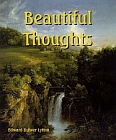
Cell of Self-Knowledge - Seven Early English Mystical Treatises

Description
of Self-Knowledge
Seven Early
English Mystical Treatises
Large Print
by Unknown
Edited with an
introduction and notes by
Edmund G. Gardner
The seven tracts or treatises before us were published in 1521 in a little quarto volume: "Imprynted at London in Poules chyrchyarde at the sygne of the Trynyte, by Henry Pepwell. In the yere of our lorde God, M.CCCCC.XXI., the xvi. daye of Nouembre."
From the Introduction:
 They may, somewhat loosely speaking, be regarded as belonging to the fourteenth century, though the first and longest of them professes to be but a translation of the work of the great Augustinian mystic of an earlier age.
They may, somewhat loosely speaking, be regarded as belonging to the fourteenth century, though the first and longest of them professes to be but a translation of the work of the great Augustinian mystic of an earlier age.
St. Bernard, Richard of St. Victor, and St. Bonaventura-all three very familiar figures to students of Dante's Paradiso-are the chief influences in the story of English mysticism. And, through the writings of his latter-day followers, Richard Rolle, Walter Hilton, and the anonymous author of the Divine Cloud of Unknowing, Richard of St. Victor is, perhaps, the most important of the three.
Himself either a Scot or an Irishman by birth, Richard entered the famous abbey of St. Victor, a house of Augustinian canons near Paris, some time before 1140, where he became the chief pupil of the great mystical doctor and theologian whom the later Middle Ages regarded as a second Augustine, Hugh of St. Victor. After Hugh's death (1141), Richard succeeded to his influence as a teacher, and completed his work in creating the mystical theology of the Church. His masterpiece, De Gratia Contemplationis, known also as Benjamin Major, in five books, is a work of marvellous spiritual insight, unction, and eloquence, upon which Dante afterwards based the whole mystical psychology of the Paradiso.2 In it Richard shows how the soul passes upward through the six steps of contemplation-in imagination, in reason, in understanding-gradually discarding all sensible objects of thought; until, in the sixth stage, it contemplates what is above reason, and seems to be beside reason, or even contrary to reason.
He teaches that there are three qualities of contemplation, according to its intensity: mentis dilatatio, an enlargement of the soul's vision without exceeding the bounds of human activity; mentis sublevatio, elevation of mind, in which the intellect, divinely illumined, transcends the measure of humanity, and beholds the things above itself, but does not entirely lose self-consciousness; and mentis alienatio, or ecstasy, in which all memory of the present leaves the mind, and it passes into a state of divine transfiguration, in which the soul gazes upon truth without any veils of creatures, not in a mirror darkly, but in its pure simplicity. This master of the spiritual life died in 1173. Amongst the glowing souls of the great doctors and theologians in the fourth heaven, St. Thomas Aquinas bids Dante mark the ardent spirit of "Richard who in contemplation was more than man."3
Benjamin, for Richard, is the type of contemplation, in accordance with the Vulgate version of Psalm lxvii.: Ibi Benjamin adolescentulus in mentis excessu: "There is Benjamin, a youth, in ecstasy of mind"-where the English Bible reads: "Little Benjamin their ruler."4 At the birth of Benjamin, his mother Rachel dies: "For, when the mind of man is rapt above itself, it surpasseth all the limits of human reasoning. Elevated above itself and rapt in ecstasy, it beholdeth things in the divine light at which all human reason succumbs. What, then, is the death of Rachel, save the failing of reason?"5
The treatise here printed under the title Benjamin is based upon a smaller work of Richard's, a kind of introduction to the Benjamin Major, entitled: Benjamin Minor; or: De Praeparatione animi ad Contemplationem. It is a paraphrase of certain portions of this work, with a few additions, and large omissions. Among the portions omitted are the two passages that, almost alone among Richard's writings, are known to the general reader-or, at least, to people who do not claim to be specialists in mediaeval theology. In the one, he speaks of knowledge of self as the Holy Hill, the Mountain of the Lord:-
160 pages - 7 x 8½, softcover
Large Print: 15 point font size
ISBN-10: 1610335295
ISBN-13: 9781610335294















